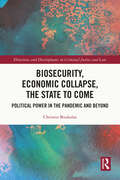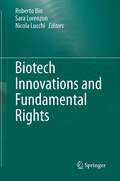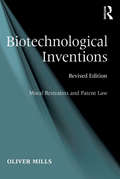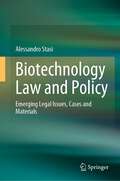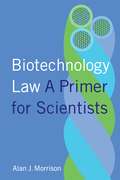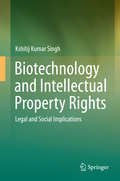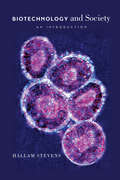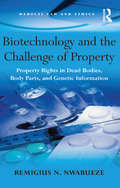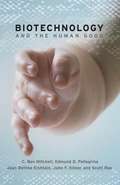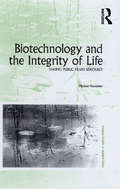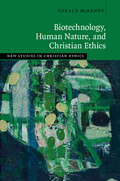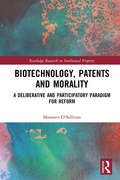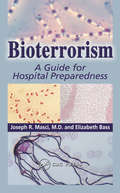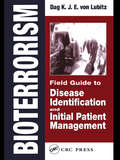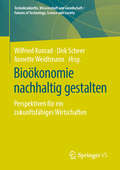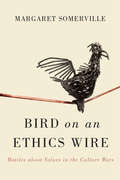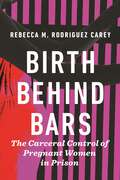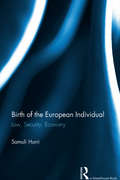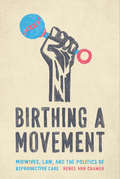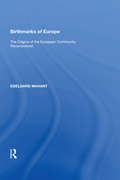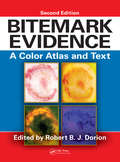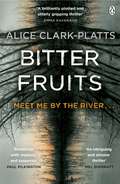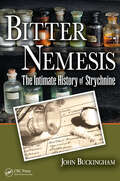- Table View
- List View
Biosecurity, Economic Collapse, the State to Come: Political Power in the Pandemic and Beyond
by Christos BoukalasThis book offers an in-depth critical account of the state’s responses to the biosecurity and the economic crises. It is thus the first study to address both crises ensuing from the pandemic, and to synthesise the responses to them in a comprehensive account of political power. What kind of state emerges from the pandemic? The pandemic caused two crises, in biosecurity and in the economy. The state was forced to tackle both; but subduing one inevitably exacerbated the other. Emerging from the impossible task of handling two conflicting crises is a new form of state, the state to come. Addressing biosecurity, the book deciphers its key modalities, epistemic premises, its law, the threat it aims to oppose, and the ways in which it relates to public health and society —especially its extraordinary power to suspend society. Addressing the economic crisis, the book deciphers the actuality and prospects of both the economy and the state’s economic policy. It claims that economic policy is now dual: it adopts countercyclical measures to serve and entrench a neoliberal economy. The responses to the twin crises inform the outline of the emerging state: its structure, logic, and legality; its power and its relation to society. This is a state of extraordinary power; but its only purpose is to preserve the social order intact. It is a despotic state: powerful, and set to impose social stasis. This book offers groundbreaking analysis based on our pandemic experience. It is indispensable for critical scholars and students in Politics, Security Studies, Sociology, Law, Political Economy and Public Health.
Biotech Innovations and Fundamental Rights
by Nicola Lucchi Roberto Bin Sara LorenzonBiotechnology is a recognized research area that has increasingly advanced into new technologies and modern practices raising several legal, ethical and regulatory issues. The revolutionary speed of biotech innovations has had a significant impact on the protection of the rights of the individual. Fundamental rights provide a framework within which the justification of limitations and restrictions to biotechnology innovations and research results have to be assessed. The legal regulation of scientific research and scientific investigations impact more and more directly on the freedom of research and therapies as well as on the broad diffusion of knowledge. Closely related is also the debated question of the technological manipulation of life and the boundary of scientific knowledge with regard to the topical question of genetic invention patents and their side effects on access to scientific information and health care opportunities. Drawing on expertise from different disciplines, the volume comprises invited papers and plenary presentations given at the conference entitled "Biotech Innovations & Fundamental Rights" that took place on Januray 20-21 2011 at the Department of Juridical Sciences of the University of Ferrara. Each contribution covers a different aspect of the legal and scientific issues involved in regulation of biotechnology. In particular the focus of attention has been given to genetic research, genetic data, freedom of scientific research in genetics and biotech patents.
Biotechnological Inventions: Moral Restraints and Patent Law
by Oliver MillsAdvances in modern biotechnology have produced profound and far-reaching implications for the relationship between humans, animals and the environment. As a result, a debate has arisen surrounding the legal, moral and social problems connected with this technology, a central part of the debate focusing on the role of moral considerations in the patent system as a form of regulation. This fully revised and updated book examines this role and asks why in the context of biotechnological inventions, morality has become an important issue. It takes account of recent developments, including reference to the situation in Australia. By examining such specific recent cases, the author elucidates the moral concerns associated with modern biotechnology, thus providing an important contribution to the debate and a valuable resource for all those working in this exciting field.
Biotechnology Law and Policy: Emerging Legal Issues, Cases and Materials
by Alessandro StasiThis book covers an extensive range of issues raised by biotechnological advancements from a regulatory perspective. Written in a clear and readable style, its main objective is to give readers an idea of the relationship between biotechnology and law. Biotechnology advancements and their ethical, moral, economic, and social implications in different fields and the consequential normative demands on the law are crucial to this book. The chapters cover a multitude of themes and some of the most important legal issues arising in relation to biotechnology, including the historical development of a legal framework sufficient to protect public safety, the current biotechnology regulatory system, and the rules directing the primary agencies that regulate the products of biotechnology, namely the US Food and Drug Administration, the US Department of Agriculture, and the US Environmental Protection Agency, patents and IP rights in biotechnology, the regulation of human genome editing and its impact on health research, law and emerging genome editing technologies from recombinant DNA to CRISPR/Cas9, the development of legal principles to protect property rights in the human body and allow the efficient use of human tissue, organs, DNA, and cell-lines in medical research, and legal issues arising from the use of genetic engineered plants and animals.Presenting arguments that have been drawn from careful examination of various international documents and decisions made by legal institutions and judicial bodies, this book would be a valuable read for practitioners as well as academics of biotechnology law.
Biotechnology Law: A Primer for Scientists
by Alan MorrisonBiotechnology and law are inextricable. Patent, regulatory, and contract law profoundly shape the biotech industry, and each of these practice areas is deeply intertwined with the science it governs. Yet many in this industry lack even a basic grasp of these laws, jeopardizing their business success as a result.This book is an essential introduction to biotechnology law for scientists, startup founders, regulatory specialists, patent liaisons, investors, academics, students, and other nonattorneys with biotech backgrounds. It covers core topics such as patentability, patent prosecution and infringement, patent opinions, the development and FDA approval of small-molecule and biologic drugs, regulatory exclusivity, generic drugs and ANDA litigation, biosimilars and the patent dance, patent licenses, and collaboration agreements. Written with scientists in mind, Biotechnology Law is a clear, concise, and entirely practical primer on the topic, replete with straightforward, real-world examples to illustrate each key concept. Understanding the legal machinery through which science becomes business is not a luxury—it is a crucial part of a scientist’s training. Alan J. Morrison’s expert treatment embraces this new reality.
Biotechnology and Intellectual Property Rights: Legal and Social Implications
by Kshitij Kumar SinghThis book offers a valuable contribution to contemporary legal literature, providing deep insights into the interface between law and genetics, highlighting emerging issues and providing meaningful solutions to current problems. It will be of interest to a broad readership, including academics, lawyers, policy makers and scholars engaged in interdisciplinary research. In the context of examining and analyzing the legal and social implications arising from the recent conjunction of biotechnology and intellectual property rights, the book particularly focuses on human genes and gene variations. Emphasis is placed on "patent law," as a considerable percentage of genetic inventions are covered by patents. The book presents a comparative and critical examination of patent laws and practices related to biotechnology patents in the United States, Canada, European Union and India, in order to gather the common issues and the differences between them. The international patent approach regarding biotechnology is also analyzed in light of the constant conflict between differentiation and harmonization of patent laws. The book highlights the potential gaps and uncertainties as to the scope of numerous terms such as invention, microorganisms, microbiological processes, and essential biological processes under TRIPS. Also analyzed are the social and policy implications of patents relating to genetic research tools and genetic testing. The intricacies involved in providing effective intellectual property protection to bioinformatics and genomic databases are also examined. Bearing in mind the collaborative nature of bioinformatics and genomic databases, the book evaluates the pros and cons of open biotechnology and assesses the implications of extending intellectual property rights to human genetic resources, before explaining the ownership puzzle concerning human genetic material used in genetic research.
Biotechnology and Society: An Introduction
by Hallam StevensWith Biotechnology and Society, Hallam Stevens offers an up-to-date primer to help us understand the interactions of biotechnology and society and the debates, controversies, fears, and hopes that have shaped how we think about bodies, organisms, and life in the twenty-first century. Stevens addresses such topics as genetically modified foods, cloning, and stem cells; genetic testing and the potential for discrimination; fears of (and, in some cases, hopes for) designer babies; personal genomics; biosecurity; and biotech art. Taken as a whole, the book presents a clear, authoritative picture of the relationship between biotechnology and society today, and how our conceptions (and misconceptions) of it could shape future developments. It is an essential volume for students and scholars working with biotechnology, while still being accessible to the general reader interested in the truth behind breathless media accounts about biotech’s promise and perils.
Biotechnology and the Challenge of Property: Property Rights in Dead Bodies, Body Parts, and Genetic Information (Medical Law And Ethics Ser.)
by Remigius N. NwabuezeBiotechnology and the Challenge of Property addresses the question of how the advancement of property law is capable of controlling the interests generated by the engineering of human tissues. Through a comparative consideration of non-Western societies and industrialized cultures, this book addresses the impact of modern biotechnology, and its legal accommodation on the customary conduct and traditional beliefs which shape the lives of different communities. Nwabueze provides an introduction to the legal regulation of the evolving uses of human tissues, and its implications for traditional knowledge, beliefs and cultures.
Biotechnology and the Human Good
by Jean Bethke Elshtain Scott B. Rae C. Ben Mitchell Edmund D. Pellegrino John F. KilnerSome of humankind's greatest tools have been forged in the research laboratory. Who could argue that medical advances like antibiotics, blood transfusions, and pacemakers have not improved the quality of people's lives? But with each new technological breakthrough there comes an array of consequences, at once predicted and unpredictable, beneficial and hazardous. Outcry over recent developments in the reproductive and genetic sciences has revealed deep fissures in society's perception of biotechnical progress. Many are concerned that reckless technological development, driven by consumerist impulses and greedy entrepreneurialism, has the potential to radically shift the human condition -- and not for the greater good. Biotechnology and the Human Good builds a case for a stewardship deeply rooted in Judeo-Christian theism to responsibly interpret and assess new technologies in a way that answers this concern. The authors jointly recognize humans not as autonomous beings but as ones accountable to each other, to the world they live in, and to God. They argue that to question and critique how fields like cybernetics, nanotechnology, and genetics might affect our future is not anti-science, anti-industry, or anti-progress, but rather a way to promote human flourishing, common sense, and good stewardship. A synthetic work drawing on the thought of a physician, ethicists, and a theologian, Biotechnology and the Human Good reminds us that although technology is a powerful and often awe-inspiring tool, it is what lies in the heart and soul of who wields this tool that truly makes the difference in our world.
Biotechnology and the Integrity of Life: Taking Public Fears Seriously
by Michael HauskellerThere are things that can be done and are done to life on earth (whether it be human, animal or plant life) which, even if they do not involve or produce any suffering, are still considered morally wrong by a large proportion of the public. Such things include changing the nature of living beings by means of genetic engineering in order to enhance their health, or, more likely with animals and plants, their utility, or impairing their ability to live autonomously, or unduly instrumentalizing them. Yet many scientists are puzzled about the unwillingness of the public to feel much enthusiasm about a technology that, in their view, promises great benefits to humans and does not seem to cause more harm to animals than other practices which most of us do not question at all. In this book Michael Hauskeller takes public fears seriously and offers the idea of 'biological integrity' as a clarifying principle which can then be analyzed to show that seemingly irrational public concerns about genetic engineering are not so irrational after all and that a philosophically sound justification of those concerns can indeed be given.
Biotechnology, Human Nature, and Christian Ethics (New Studies in Christian Ethics)
by Gerald McKennyIn public debates over biotechnology, theologians, philosophers, and political theorists have proposed that biotechnology could have significant implications for human nature. They argue that ethical evaluations of biotechnologies that might affect human nature must take these implications into account. In this book, Gerald McKenny examines these important yet controversial arguments, which have in turn been criticized by many moral philosophers and professional bioethicists. He argues that Christian ethics is, in principle, committed to some version of the claim that human nature has normative status in relation to biotechnology. Showing how both criticisms and defences of this claim have often been facile, he identifies, develops, and critically evaluates three versions of the claim, and contributes a fourth, distinctively Christian version to the debate. Focusing on Christian ethics in conversation with secular ethics, McKenny's book is the first thorough analysis of a controversial contemporary issue.
Biotechnology, Patents and Morality: A Deliberative and Participatory Paradigm for Reform (Routledge Research in Intellectual Property)
by Maureen O'SullivanThis book critiques the decision-making process in Article 53(a) of the European Patent Convention. To date, such decisions have been taken at high levels of expertise without much public involvement. The book eschews traditional solutions, such as those found within legislative, judicial and patent office realms and instead develops a radical blueprint for how these decisions can be put to the public. By examining wide-scale models of participatory democracy and deliberation, this book fills a significant gap in the literature. It will be invaluable for patent lawyers, academics, practitioners and intellectual property and patent officials.
Bioterrorism: A Guide for Hospital Preparedness
by Elizabeth Bass Joseph R. Masci M.D.In the battle against bioterrorism, one of the greatest challenges is finding the ideal balance between complacency and overreaction. The goal is to be so well prepared that we can prevent catastrophic outcomes in the event of a bioterrorist attack, while strengthening our ability to prevent and treat naturally-occurring infectious diseases.Bioterr
Bioterrorism: Field Guide to Disease Identification and Initial Patient Management
by Dag K.J.E. von LubitzThe outbreak of anthrax infections that followed September 11, 2001, showed all too clearly that while we can defend ourselves against bioterrorism, our defenses need improvement. What's most important is the ability to recognize the associated disease, and recognize them quickly. Yet, many in the medical world are unfamiliar with the characteristi
Bioökonomie nachhaltig gestalten: Perspektiven für ein zukunftsfähiges Wirtschaften (Technikzukünfte, Wissenschaft und Gesellschaft / Futures of Technology, Science and Society)
by Dirk Scheer Wilfried Konrad Annette WeidtmannIn diesem Sammelband werden die Herausforderungen und Potenziale einer zukünftig nachhaltig zu gestaltenden Bioökonomie interdisziplinär beleuchtet. Hierbei wird die Bioökonomie als sozio-technisches System aufgefasst, in dem die technische Ausgestaltung aufs Engste mit sozialen, ökonomischen und politischen Elementen verknüpft ist. Aus unterschiedlichen Perspektiven wird die Transformation des herkömmlichen Wirtschaftens in Richtung einer bioökonomischen Wirtschaftsweise thematisiert. Aspekte von Umbau bzw. Transformation und Zukunftsgestaltung stehen dabei im Mittelpunkt.
Bird Ambulance
by Arline ThomasStories from a woman in New York who began her own shelter for injured wild birds. She talks about assisting falcons, hawks, pigeons and owls, but there is also a chapter on other animals--like squirrels--who come into her life. A fantastic read with helpful information on what to feed injured birds and mammals.
Bird on an Ethics Wire: Battles about Values in the Culture Wars
by Margaret SomervilleOur physical ecosystem is not indestructible and we have obligations to hold it in trust for future generations. The same is true of our metaphysical ecosystem - the values, principles, attitudes, beliefs, and shared stories on which we have founded our society. In Bird on an Ethics Wire, Margaret Somerville explores the values needed to maintain a world that reasonable people would want to live in and pass on to their descendants. Somerville addresses the conflicts between people who espouse "progressive" values and those who uphold "traditional" ones by casting her attention on the debates surrounding "birth" (abortion and reproductive technologies) and "death" (euthanasia) and shows how words are often used as weapons. She proposes that we should seek to experience amazement, wonder, and awe to enrich our lives and help us to find meaning. Such experiences, Somerville believes, can change how we see the world and live our lives, and affect the decisions we make, especially regarding values and ethics. They can help us to cope with physical or existential suffering, and ultimately put us in touch with the sacred - in either its secular or religious form - which protects what we must not destroy. Experiencing amazement, wonder, and awe, Somerville concludes, can also generate hope, without which our spirit dies. Both individuals and societies need hope, a sense of connection to the future, if the world is to make the best decisions about values in the battles that constitute the current culture wars.
Bird on an Ethics Wire: Battles about Values in the Culture Wars
by Margaret SomervilleOur physical ecosystem is not indestructible and we have obligations to hold it in trust for future generations. The same is true of our metaphysical ecosystem - the values, principles, attitudes, beliefs, and shared stories on which we have founded our society. In Bird on an Ethics Wire, Margaret Somerville explores the values needed to maintain a world that reasonable people would want to live in and pass on to their descendants. Somerville addresses the conflicts between people who espouse "progressive" values and those who uphold "traditional" ones by casting her attention on the debates surrounding "birth" (abortion and reproductive technologies) and "death" (euthanasia) and shows how words are often used as weapons. She proposes that we should seek to experience amazement, wonder, and awe to enrich our lives and help us to find meaning. Such experiences, Somerville believes, can change how we see the world and live our lives, and affect the decisions we make, especially regarding values and ethics. They can help us to cope with physical or existential suffering, and ultimately put us in touch with the sacred - in either its secular or religious form - which protects what we must not destroy. Experiencing amazement, wonder, and awe, Somerville concludes, can also generate hope, without which our spirit dies. Both individuals and societies need hope, a sense of connection to the future, if the world is to make the best decisions about values in the battles that constitute the current culture wars.
Birth Behind Bars: The Carceral Control of Pregnant Women in Prison
by Rebecca M. CareyPregnant women's experiences in prisonFour percent of incarcerated women—more than three thousand—are pregnant in US prisons each year, yet little information is known about their pregnancy, birth, postpartum, and motherhood experiences. In Birth Behind Bars, Rebecca M. Rodriguez Carey draws on in-depth interviews with women who were once pregnant in prisons in the heart of the Midwest to provide a rare, intimate portrait into the intersection of motherhood and incarceration.Using a reproductive-justice framework and narrative accounts, Rodriguez Carey shows how the prison system works alongside other carceral systems, such as the medical system and the child welfare system, to regulate and control women. She reveals how their incarceration goes beyond the function of criminal punishment, threatening both maternal and fetal health and the well-being of families. Birth Behind Bars offers an evocative account of how these powerful carceral systems collectively disrupt entire families and communities during pregnancy, birth, and the postpartum period, including long after women are released from prison.
Birth of the European Individual: Law, Security, Economy
by Samuli HurriThis book examines the birth of the European individual as a juridical problem, focusing on legal case dossiers from the European Court of Justice as an electrifying laboratory for the study of law and society. Foucault’s story of the modern subject constitutes the book’s main theoretical inspiration, as it considers the encounter between legal and other practices within a more general field of juridical power: a network of active relations, between different social spheres. Through the analysis of delinquent individuals – each expelled from one of the Member States – the raw material for constructing the idea of the European individual is uncovered. The European individual, it is argued, emerged out of the intersection of regimes of law, security and economy, and its practices of knowledge-power. Birth of the European Individual: Law, Security, Economy will be of interest to those studying the individual in law, as well as anyone considering the relationships between power and the individual.
Birthing a Movement: Midwives, Law, and the Politics of Reproductive Care
by Renée Ann CramerRich, personal stories shed light on midwives at the frontier of women's reproductive rights. Midwives in the United States live and work in a complex regulatory environment that is a direct result of state and medical intervention into women's reproductive capacity. In Birthing a Movement, Renée Ann Cramer draws on over a decade of ethnographic and archival research to examine the interactions of law, politics, and activism surrounding midwifery care. Framed by gripping narratives from midwives across the country, she parses out the often-paradoxical priorities with which they must engage—seeking formal professionalization, advocating for reproductive justice, and resisting state-centered approaches. Currently, professional midwives are legal and regulated in their practice in 32 states and illegal in eight, where their practice could bring felony convictions and penalties that include imprisonment. In the remaining ten states, Certified Professional Midwives (CPMs) are unregulated, but nominally legal. By studying states where CPMs have differing legal statuses, Cramer makes the case that midwives and their clients engage in various forms of mobilization—at times simultaneous, and at times inconsistent—to facilitate access to care, autonomy in childbirth, and the articulation of women's authority in reproduction. This book brings together literatures not frequently in conversation with one another, on regulation, mobilization, health policy, and gender, offering a multifaceted view of the experiences and politics of American midwifery, and promising rich insights to a wide array of scholars, activists, healthcare professionals alike.
Birthmarks of Europe: The Origins of the European Community Reconsidered
by Edelgard MahantBy studying the negotiations which led to the conclusion of the original Treaty of Rome and the creation of the European Economic Community, this informative book, based on recently released archival sources, analyses the Franco-German bargain which shaped the Community's initial framework and policies. This is not just another book about Franco-German relations and the founding of the European Union. It presents a new theoretical framework which relates the founding of the European Community to its later development. An attempt to apply the ideational framework of the original Community to later developments, such as the single market and the Treaty on European Union, finds that the Union is still shaped by many of the ideas of the founding fathers. Birthmarks of Europe will be useful to teachers and students of the history and politics of the European Union, as well as to those studying the dynamics of the development of other regional integration networks.
Bitemark Evidence: A Color Atlas and Text, 2nd Edition (International Forensic Science and Investigation)
by Robert B. J. DorionExperts in the field of bitemark evidence confront complexities ranging from the identification and collection of evidence, to microscopic analysis, to legal implications and courtroom admissibility. Now in its second edition, Bitemark Evidence reflects the knowledge, training, experience, opinions, and research of 27 authors from around the world
Bitter Fruits: DI Erica Martin Book 1 (Erica Martin Thriller)
by Alice Clark-PlattsA stunning debut - part psychological thriller, part detective novel - from a powerful and distinctive new voice.The murder of a first-year university student shocks the city of Durham. The victim, Emily Brabents, was from the privileged and popular set at Joyce College, a cradle for the country's future elite.As Detective Inspector Erica Martin investigates the college, she finds a close-knit community fuelled by jealousy, obsession and secrets. But the very last thing she expects is an instant confession . . .The picture of Emily that begins to emerge is that of a girl wanted by everyone, but not truly known by anyone. Anyone, that is, except Daniel Shepherd. Her fellow student, ever-faithful friend and the only one who cares. The only one who would do anything for her . . .* * *Praise for Bitter Fruits:'There is a gripping, economic precision in this highly charged thriller.'Ralph Fiennes'Grabbed me from the first page and wouldn't let go. A compelling read, beautifully written ... A tense, captivating tale, brilliantly told'Rachel Abbott'Once I started reading it I couldn't stop. A brilliantly plotted and utterly gripping thriller.' Emma Kavanagh'Superbly gripping ... A very assured page-turning storm I read in one sitting.'Stav Sherez'A psychological police procedural ... An intelligent and thrilling debut.'Peter Guttridge, author and former Observer crime critic'Intriguing and sinister with masterful plotting and tension. A bittersweet read by a new crime author I can't wait to read again.' Mel Sherratt'A thought-provoking, atmospheric and emotional page turning thriller - brimming with mystery and suspense. I absolutely loved this novel, and devoured it from cover to cover.'Paul Pilkington
Bitter Nemesis: The Intimate History of Strychnine
by John BuckinghamEncouraged by the medicinal success of quinine, early 19th century scientists hoped strychnine, another plant alkaloid with remarkable properties, might also become a new weapon against disease. Physicians tried for over a century, despite growing evidence to the contrary, to treat everything from paralysis to constipation with it. But strychnine p
